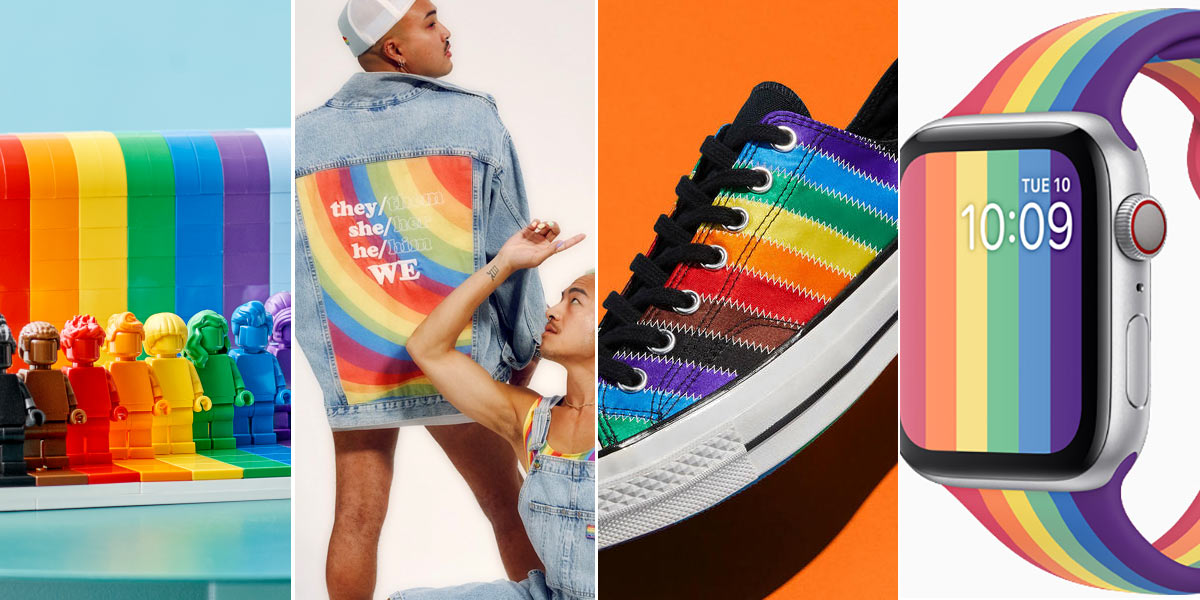How businesses can be better LGBTQ allies all year long

Authentic or performative? Lego, Levi’s, Converse and Apple celebrate Pride Month
Every Pride Month sees swathes of rainbows filling our timelines on social media, in part due to companies and brands that make a show of their allyship by sharing rainbow variations of their logo or products.
Activists and LGBTQ organisations would be forgiven for considering all this hullabaloo mere corporate tick-boxing and “virtue signalling” – after all, how many corporates regularly post about their commitment to LGBTQ inclusion during the rest of the year?
While The Pink Rand was estimated to be worth around R152 billion in 2017, supporting equality issues shouldn’t be something that is done only for the rands-and-cents value that it has for a corporate organisation. While profit is at the forefront of any business’s marketing agenda, organisations also support causes because of the corporate social value it adds to their product or service offering.
How to make inclusion a central part of your business’s ethos
In a world where businesses are increasingly held accountable for the contribution they make to society, along with what they’re selling, the corporate sphere is well aware that showing support for worthy causes is of paramount importance.
With that being said, it is very easy to spot a company that is only getting on a bandwagon when days or months marking certain social issues or commemorations come by.
On local shores, the rainbow bandwagon is in full swing two or three times a year: during International Pride Month in June, in October, when Pride Month is celebrated in South Africa, and in late February, when Cape Town Pride takes place.
Whatever clever marketing campaigns corporations come up with, local civil society organisations and the LGBTQ community at large have no difficulty spotting businesses that are only using the cause to further their own marketing efforts.
When it comes to real inclusion, trying to avoid performative marketing that is only done for 30 days a year is a good starting point, but businesses that are aiming for something that feels authentic and not just tokenistic can consider making the following points a part of their year-round LGBTQ -inclusive agenda.
- In contrast with rainbow capitalism, authentic corporate allyship doesn’t focus solely on gaining social capital but instead springs from taking action. A marketing campaign with authentic allyship at its core will focus on what a company is already doing to promote an LGBTQ-inclusive work environment, and in which ways it is aiming to do more or show support to LGBTQ organisations and the community.
- Simply changing the company’s logo so a rainbow is somehow incorporated also won’t cut it in today’s political climate. Instead, companies can opt to donate to LGBTQ organisations, or lend their social media platforms to LGBTQ employees or organisations during Pride Month, extending the reach of these organisations’ message.
- Sharing inclusive company policies also lends some authenticity to any pro-Pride messaging. Should a company not have such policies in place, these should be prioritised.
- When it comes to Pride marketing, businesses should avoid stereotypical messaging, imagery and language. In this regard, it might be useful to speak to LGBTQ employees and run campaigns past them.
- Representation doesn’t only matter in June or in October: companies come across far more queer-friendly when they always include the LGBTQ community in their marketing material, as they would with any minority group.
- An effective way of showing corporate allyship is to directly advertise in the LGBTQ media with bespoke campaigns. It’s not only a powerful way of connecting with the LGBTQ community and creating brand loyalty but also gives back by supporting the sustainability of much-needed LGBTQ voices in the media space.
Partner with civil society organisations to ensure your finger is always on the pulse
Making inclusion a real and tangible part of a business’s marketing efforts year-round can be difficult initially, which is why consulting with civil society organisations that specifically work with gender and sexuality can be especially useful.
Workplace Pride, Open For Business, The Other Foundation and The Global Equity Fund recently partnered to put together the Civil Society Business Toolkit. Focused on civil society organisations, the Civil Society Business Toolkit helps to empower these organisations in their efforts to take hands with corporates to achieve the aim of greater LGBTQ+ inclusion.
Although this free guide looks at inclusion from the side of civil society, businesses can also benefit from learning why these efforts are not only important for society at large but also benefit their bottom line.
Ultimately, learning about any cause from the people aiming to further it will help create marketing campaigns and company policies that are authentic and can be taken seriously by the community they target.
Download the Civil Society Business Toolkit here.
Leave a Reply